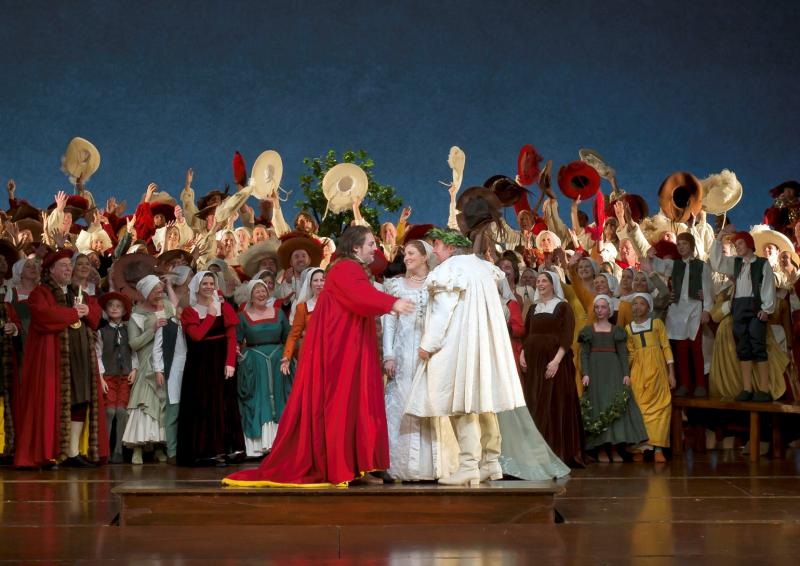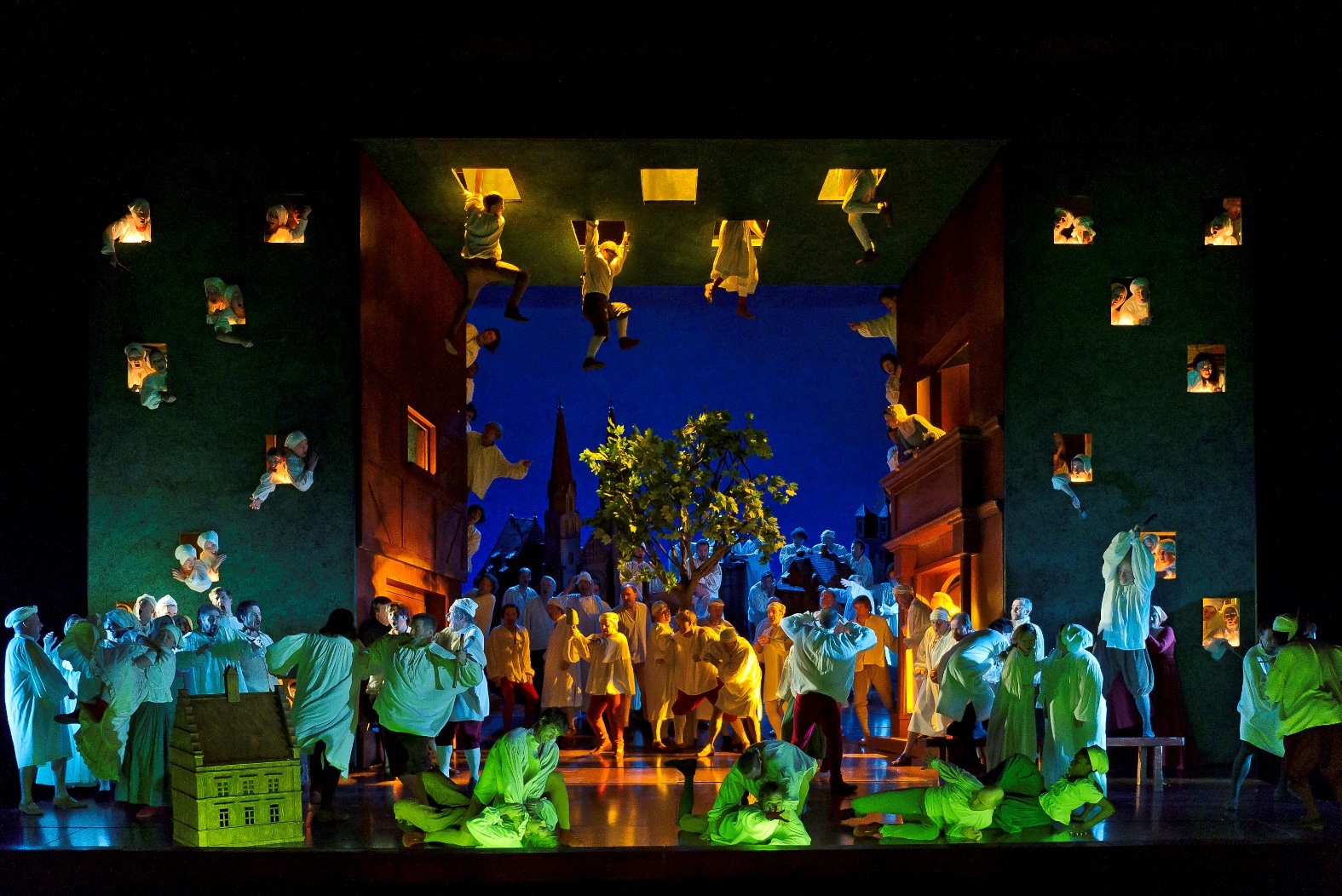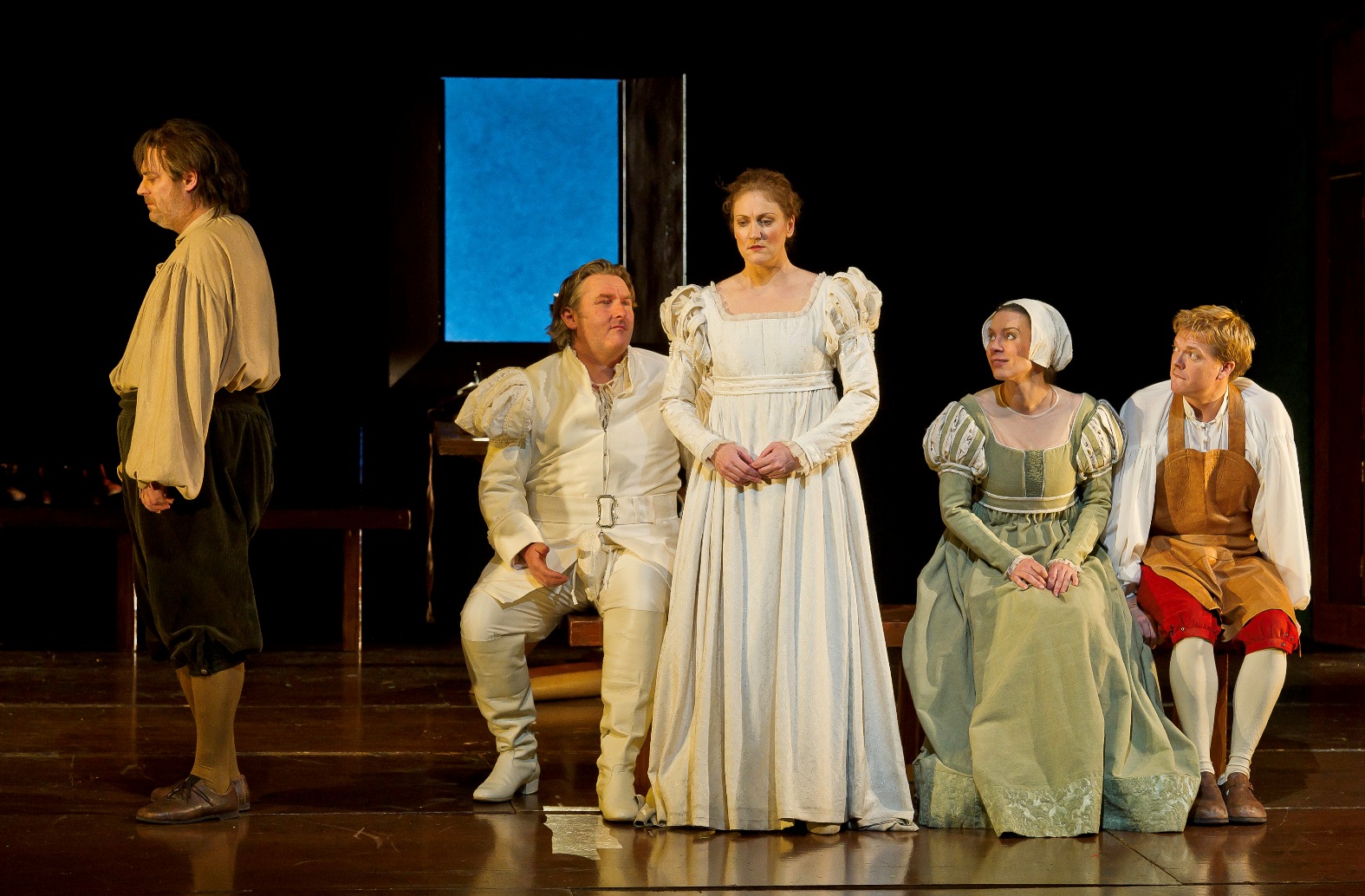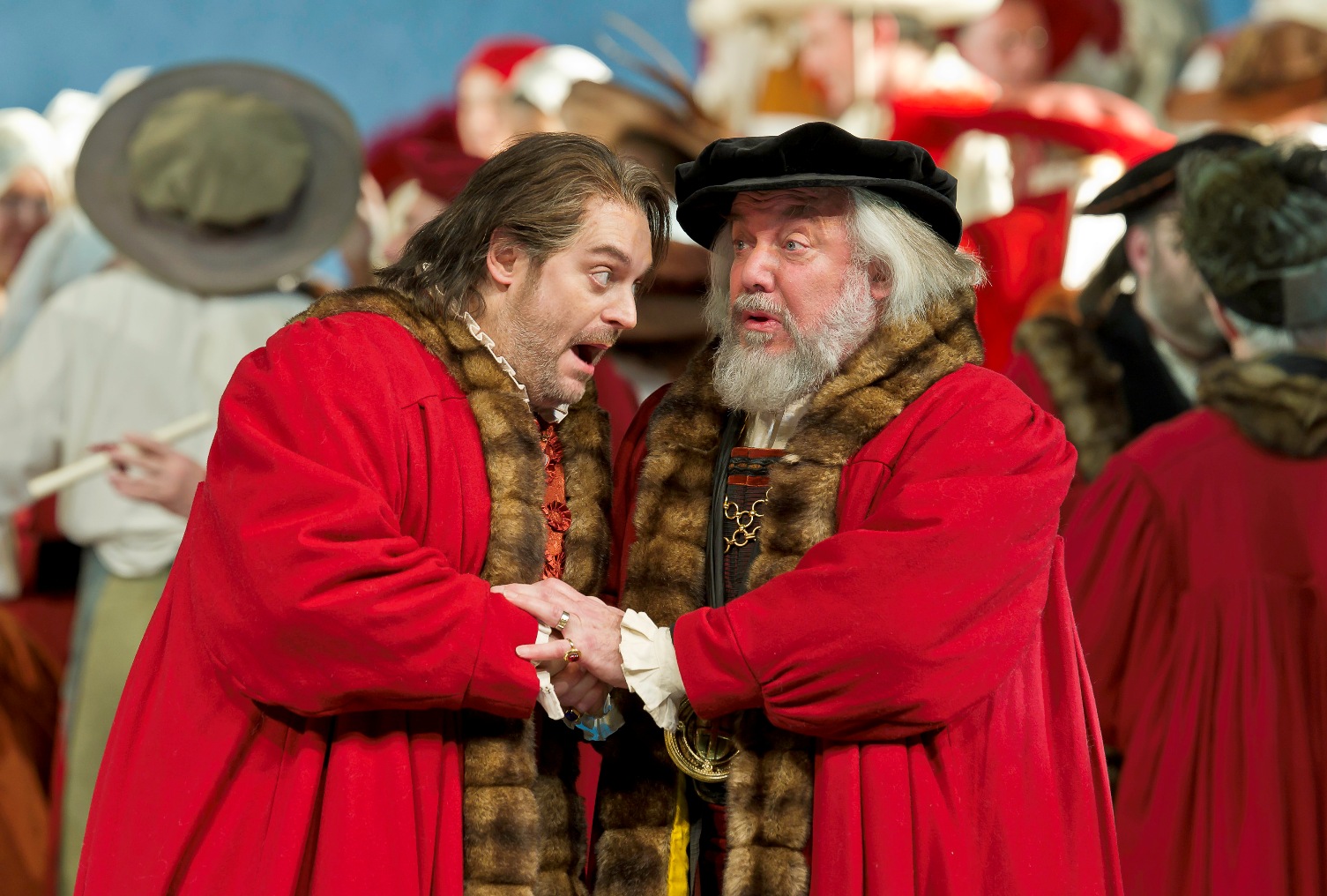Die Meistersinger von Nürnberg, Royal Opera | reviews, news & interviews
Die Meistersinger von Nürnberg, Royal Opera
Die Meistersinger von Nürnberg, Royal Opera
Sunny, unseasonal festivities, but a strong revival doesn't plumb all Wagner's depths

A young chap from Elsewhere woos an alderman's daughter: not Dick Whittington in panto London, but Wagner's Walther von Stolzing in an unseasonal Nuremberg.
I'm not suggesting for a moment any yanking-forward in Germany's troubled history, least of all to any time since this plea for great national art was penned. There was a bit of earlier, cheerful anachronism about David McVicar's Biedermeier vision at Glyndebourne as well as in Richard Jones's Welsh National Opera production, the most detailed, perceptive and, alas, short-lived we've seen in recent years; still, both ended in irony-free harmony. Graham Vick's long-serving Royal Opera show is a cosy, almost cartoonish vision of Dürer's golden age with prominent roles for codpieces, model city landmarks and mullets.
It works especially well in the lively finales, the first two of which Pappano springs into miraculously co-ordinated life. Outsider Walther's rocking of the established mastersingers' tight ship is exuberantly served as Simon O'Neill's bright, stalwart if sometimes under-ballasted tenor takes wing with his rhapsody - it can't be stressed too much how supportive the conducting is of the singers' need to move forward and survive the evening - and Act II ends with meticulously choreographed and voiced civic brawling. Vick's production as restaged by Elaine Kidd and Richard Hudson's designs still pull out the stops out here (pictured below) and there's even a hint of a more realistic wanton destruction as a yob sets about smashing up one of the toy houses. The problem for me rests with the tirelessly well sung Hans Sachs of Wolfgang Koch. Sachs is the philosopher-cobbler with whose emerging predicament - a balance between the love he clearly feels for young Eva Pogner and a desire that inspired musical-poetic youth in the form of her more youthfully suitable match Walther should win the contest - the public should increasingly engage. We've been spoiled to a certain extent by Gerald Finley's surprise success in the part at Glyndebourne - he doesn't have the line that the more baritonal Koch can spin through the bigger phrases, but by Act III most of the audience was rooting for him - and still more by Bryn Terfel, Sachs to the life. No doubt Terfel, when he takes over the role in a one-off Royal Opera concert performance in Birmingham, will bring something of the deeper despair out of which Jones's Sachs had to rouse himself. But he might have had a harder time in the context of this revival, which rather sells short the uncommon cobbler's shock at everyday folly.
The problem for me rests with the tirelessly well sung Hans Sachs of Wolfgang Koch. Sachs is the philosopher-cobbler with whose emerging predicament - a balance between the love he clearly feels for young Eva Pogner and a desire that inspired musical-poetic youth in the form of her more youthfully suitable match Walther should win the contest - the public should increasingly engage. We've been spoiled to a certain extent by Gerald Finley's surprise success in the part at Glyndebourne - he doesn't have the line that the more baritonal Koch can spin through the bigger phrases, but by Act III most of the audience was rooting for him - and still more by Bryn Terfel, Sachs to the life. No doubt Terfel, when he takes over the role in a one-off Royal Opera concert performance in Birmingham, will bring something of the deeper despair out of which Jones's Sachs had to rouse himself. But he might have had a harder time in the context of this revival, which rather sells short the uncommon cobbler's shock at everyday folly.
 Koch's Sachs does snap, rather impressively but too late; and though good at the geniality, he's one of several characters who need more help with movement (the backward walk looks awkward). Two who don't are Toby Spence's thoroughly likeable apprentice David - evidently a Walter in waiting - and Emma Bell's Eva, a model of well-pointed diction and a soprano at last up to the sudden demands of the grateful apostrophe to Sachs as friend and guide. She also gives us the best opening lines in the Quintet (pictured left to right: Koch, O'Neill, Bell, Heather Shipp's Magdalene, Spence) since Felicity Lott. Peter Coleman-Wright is a safe, cleanly sung, not terribly funny but never overdone Beckmesser; the fine line between realism and humour really needs a stronger directorial viewpoint.
Koch's Sachs does snap, rather impressively but too late; and though good at the geniality, he's one of several characters who need more help with movement (the backward walk looks awkward). Two who don't are Toby Spence's thoroughly likeable apprentice David - evidently a Walter in waiting - and Emma Bell's Eva, a model of well-pointed diction and a soprano at last up to the sudden demands of the grateful apostrophe to Sachs as friend and guide. She also gives us the best opening lines in the Quintet (pictured left to right: Koch, O'Neill, Bell, Heather Shipp's Magdalene, Spence) since Felicity Lott. Peter Coleman-Wright is a safe, cleanly sung, not terribly funny but never overdone Beckmesser; the fine line between realism and humour really needs a stronger directorial viewpoint.
Never mind; the Quintet's happy sunshine is what we need to stay out for the colourful St John's Day revels down in the meadows: the Covent Garden stage has far more space to play with than Glyndebourne in the too up-front McVicar staging, and the guild processions, including bespectacled tailors and floury bakers, still look good. Collectors of Meistersinger performances - and they are even more legion than the fair number of productions the masterpiece has notched up over recent decades - will relish a strong last meeting (pictured below) between the Sachs of today (Koch) and of the recent past (John Tomlinson, now in authoritative if rather loud voice as father Pogner).
 Most impressive is how much of this multi-faceted score Pappano already has under his belt. The interpretation can only get stronger, and may hit a yet more eloquent, profound stride in the crucial confrontations of the morning before the song-contest, but there's no sense either of slack or rush. This has really been quite the year for the ongoing great work of the Royal Opera's Music Director, and it should be recognised as such by the wider telly-watching public who rightly warmed to his Opera Italia series when he introduces his own performance of Tosca at length on Christmas Eve. A skilled practitioner who can really put across the meaning and value of his subject on TV rather than a celebrity presenter: now that's something we need much more of during 2012 - assuming BBC Four is still around to deliver it.
Most impressive is how much of this multi-faceted score Pappano already has under his belt. The interpretation can only get stronger, and may hit a yet more eloquent, profound stride in the crucial confrontations of the morning before the song-contest, but there's no sense either of slack or rush. This has really been quite the year for the ongoing great work of the Royal Opera's Music Director, and it should be recognised as such by the wider telly-watching public who rightly warmed to his Opera Italia series when he introduces his own performance of Tosca at length on Christmas Eve. A skilled practitioner who can really put across the meaning and value of his subject on TV rather than a celebrity presenter: now that's something we need much more of during 2012 - assuming BBC Four is still around to deliver it.
Add comment
The future of Arts Journalism
You can stop theartsdesk.com closing!
We urgently need financing to survive. Our fundraising drive has thus far raised £49,000 but we need to reach £100,000 or we will be forced to close. Please contribute here: https://gofund.me/c3f6033d
And if you can forward this information to anyone who might assist, we’d be grateful.

Subscribe to theartsdesk.com
Thank you for continuing to read our work on theartsdesk.com. For unlimited access to every article in its entirety, including our archive of more than 15,000 pieces, we're asking for £5 per month or £40 per year. We feel it's a very good deal, and hope you do too.
To take a subscription now simply click here.
And if you're looking for that extra gift for a friend or family member, why not treat them to a theartsdesk.com gift subscription?
more Opera
 Tosca, Welsh National Opera review - a great company reduced to brilliance
The old warhorse made special by the basics
Tosca, Welsh National Opera review - a great company reduced to brilliance
The old warhorse made special by the basics
 BBC Proms: The Marriage of Figaro, Glyndebourne Festival review - merriment and menace
Strong Proms transfer for a robust and affecting show
BBC Proms: The Marriage of Figaro, Glyndebourne Festival review - merriment and menace
Strong Proms transfer for a robust and affecting show
 BBC Proms: Suor Angelica, LSO, Pappano review - earthly passion, heavenly grief
A Sister to remember blesses Puccini's convent tragedy
BBC Proms: Suor Angelica, LSO, Pappano review - earthly passion, heavenly grief
A Sister to remember blesses Puccini's convent tragedy
 Orpheus and Eurydice, Opera Queensland/SCO, Edinburgh International Festival 2025 review - dazzling, but distracting
Eye-popping acrobatics don’t always assist in Gluck’s quest for operatic truth
Orpheus and Eurydice, Opera Queensland/SCO, Edinburgh International Festival 2025 review - dazzling, but distracting
Eye-popping acrobatics don’t always assist in Gluck’s quest for operatic truth
 MARS, Irish National Opera review - silly space oddity with fun stretches
Cast, orchestra and production give Jennifer Walshe’s bold collage their all
MARS, Irish National Opera review - silly space oddity with fun stretches
Cast, orchestra and production give Jennifer Walshe’s bold collage their all
 Káťa Kabanová, Glyndebourne review - emotional concentration in a salle modulable
Janáček superbly done through or in spite of the symbolism
Káťa Kabanová, Glyndebourne review - emotional concentration in a salle modulable
Janáček superbly done through or in spite of the symbolism
 Buxton International Festival 2025 review - a lavish offering of smaller-scale work
Allison Cook stands out in a fascinating integrated double bill of Bernstein and Poulenc
Buxton International Festival 2025 review - a lavish offering of smaller-scale work
Allison Cook stands out in a fascinating integrated double bill of Bernstein and Poulenc
 Tosca, Clonter Opera review - beauty and integrity in miniature
Happy surprises and a convincing interpretation of Puccini for today
Tosca, Clonter Opera review - beauty and integrity in miniature
Happy surprises and a convincing interpretation of Puccini for today
 Hamlet, Buxton International Festival review - how to re-imagine re-imagined Shakespeare
Music comes first in very 19th century, very Romantic, very French operatic creation
Hamlet, Buxton International Festival review - how to re-imagine re-imagined Shakespeare
Music comes first in very 19th century, very Romantic, very French operatic creation
 Falstaff, Glyndebourne review - knockabout and nostalgia in postwar Windsor
A fat knight to remember, and snappy stagecraft, overcome some tedious waits
Falstaff, Glyndebourne review - knockabout and nostalgia in postwar Windsor
A fat knight to remember, and snappy stagecraft, overcome some tedious waits
 Salome, LSO, Pappano, Barbican review - a partnership in a million
Asmik Grigorian is vocal perfection in league with a great conductor and orchestra
Salome, LSO, Pappano, Barbican review - a partnership in a million
Asmik Grigorian is vocal perfection in league with a great conductor and orchestra
 Semele, Royal Opera review - unholy smoke
Style comes and goes in a justifiably dark treatment of Handelian myth
Semele, Royal Opera review - unholy smoke
Style comes and goes in a justifiably dark treatment of Handelian myth

Comments
I heard the Dec 22